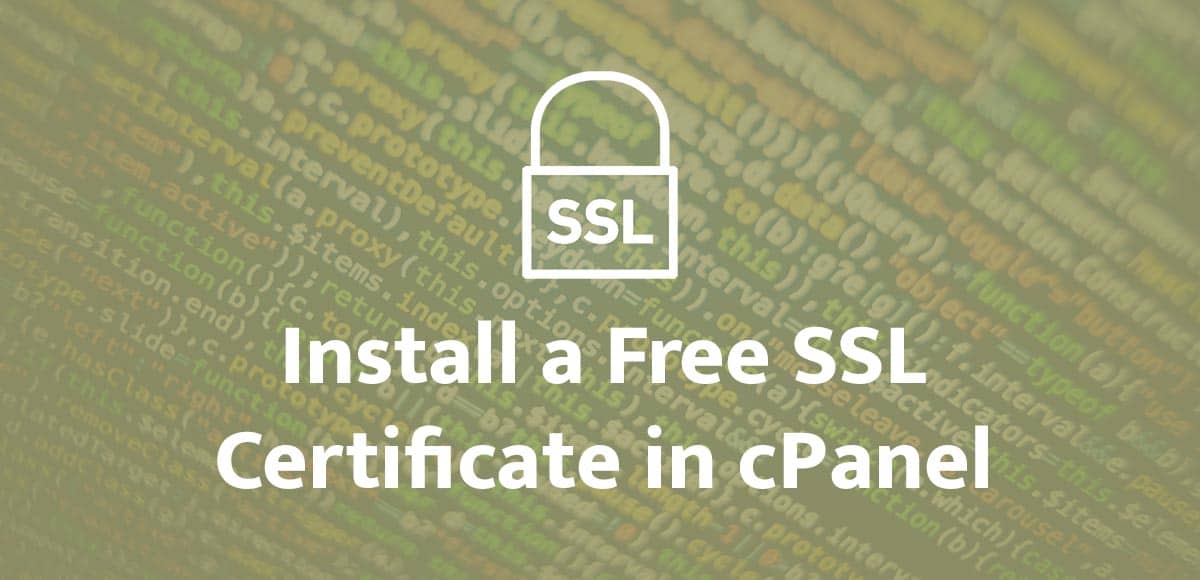Online consumers and users demand and expect SSL certification from practically every website they visit these days. So, it doesn’t matter if you’re a street musician, a student working out of your dorm room, or a small business with only a handful of employees. If you have any kind of online presence, you need to make sure that your website has SSL certification.
Doing business online has leveled the playing field and lets individuals and small companies compete with huge enterprises. However, your operating budget is also likely very tight. Fortunately, it’s possible to get free SSL certification in some circumstances.
To keep your expenses low while making users trust your site security, you should look into free SSL certificate hosting. Knowing how to install a free SSL certificate in cPanel makes it easy to set things up with your website.
Why Have an SSL Certificate?
Anytime you go about building a website, you have a lot of things you need to take care of. One of them should be an SSL certificate.
Having an SSL certificate means you have a powerful and crucial tool that secures your website. It reassures your visitors with a visual reminder that their connection to your website is something that they can trust.
The majority of current mobile devices and browsers will actually warn users to avoid sites based on the security protocols used. The SSL certificate that is installed is the basis for all of this, so installing free and fast SSL is a really good choice to make on your website.
There can even be SEO benefits to forcing SSL into website use. Most search engines rank sites higher if there is an SSL certificate in place.
What Do SSL Certificates Do?
Basically put, an SSL certificate is just a digital file containing information that makes it possible to authenticate a website’s owner. This digital information includes a cryptographic key that an official certificate authority provides and authenticates. This means a user can verify that your website is trustworthy.
How do they do this? Typically, it’s a ‘green padlock’ that shows up in the browser address bar. Other browsers might use an uncrossed, solid padlock. Whatever the symbol is, users of that browser immediately know that there’s an SSL certificate in place to secure their connection and data.
If your website is a small operation, whether it’s just for personal use or for a small business, then you might be looking for the cheapest website hosting you can find to save money and maximize potential profit margin. It won’t matter if your website visitors don’t trust you with their personal information, login credentials, or credit card information.
You’ll also enjoy encrypted data online. You’ll make it much harder for hackers to steal customer information through various attacks. You can use free auto SSL to accomplish this.
Free or Paid SSL
Whether you look into manual or auto SSL options, you may notice that there are free options and premium or paid ones. Generally speaking, the level of encryption provided for both is approximately the same.
The difference is that a free certificate uses a server name indication that doesn’t have a dedicated IP address. What that means is that more than one domain might have the same IP address and have an SSL.
Premium or dedicated certificates have more in-depth authentication. They can be better options for large-scale e-commerce stores, but if you’re just starting out, it might also be overkill. A purely informational website is certainly fine with free SSL.
How to Install an SSL Certificate in cPanel 11
Once you have an SSL certificate, you need to put it on your server. Download any SSL certificate you have, along with the support files. You’ll probably receive them via an email from your SSL manager, or there might be a download link you can use once fulfillment has happened.
Unzip your files. Then, copy them into any directory where you have decided to keep certificates. Based on what kind of server you have, there might be some files from the zip that don’t even get used.
Installing SSL server certification files starts with logging in to cPanel. Find your SSL/TLS manager, and then click on it. Next, go into Certificates, which might be listed as CRT.
You’ll see options for generating, deleting, uploading, or viewing SSL certificates. Click on upload for a new certificate, and then use the browse button to locate the SSL server certification file. It might be named your_domain_com.txt.
Click on your upload button, and then use the link listed as Go Back to get back to your SSL/TLS manager. Now it’s time to set up your domain.
Your drop-down menu of domains might have more than one. Pick which domain is going to have the SSL certificate. That will make the system try to get the SSL certificate, as well as the corresponding private key.
Find your GeoTrust_Intermediate.txt file and open it in either Notepad or another basic text editor. Don’t use Word. Use a copy-and-paste function to paste all your GeoTrust_Intermediate.txt file contents into the Ca Bundle box, which might be listed as “CABUNDLE”.
When you see the option for Install Certificate, click on it. You ought to get a message that you have successfully installed your certificate. Should you get an error message, you might need to consult your web hoster for more support.
Verifying the installation of an SSL certificate is easy. Just load your website in any browser. Put the word ‘secure’ before your website name, and you should see the padlock icon.
What Does SSL Stand For?
SSL is short for a secure sockets layer. It’s a standard security protocol used to establish encrypted connections that link up website servers with individual browsers in a way that prevents hackers and cybercriminals from accessing or modifying transactions between people.
This allows for the safe transmission of personal and sensitive information. Credit card numbers are one such example. SSL encryption means that data exchanged between website users and the host stays secure and private.
SSL is very safe while data is in transit, but as a webmaster, it’s up to you to make sure that your database is also encrypted. Fortunately, there are many ways to achieve this via cPanel.
Your website needs to have SSL, regardless of what kind of website you have. There was a time that SSL was really only necessary for e-commerce websites or domains that required registration and login information. However, hackers now target all kinds of websites.
There’s also the matter of browsers and Google penalizing websites that don’t have SSL. Even a simple informational blog without SSL can trigger a “Not Secure” warning that might turn users away due to safety concerns or suspicions about what’s going on with your website.
The SSL certification system you can use for free in cPanel is based on the RSA scheme of encryption that uses both asymmetric and symmetric protocols. Asymmetric encryption is useful in creating secure client-server connections, whereas symmetric encryption is applied for the exchange of information to happen securely over that established connection.
Free SSL Certificates
While there are premium versions of SSL certificates available, you can also get free ones from many places. In fact, many web hosters actually offer free certificates with many of their plans. If you want to spend most of your time on your website content and activity instead of just managing it, then your best bet is to find an affordable plan that includes cPanel and free SSL. While it’s useful to know how to install an SSL certificate, you might even be able to automate it to save even more time.
If you do need to find a free SSL certificate, then consider the following options:
- Cloud Flare: This is one of the most popular security companies available. They recently announced that they are going to offer free SSL options to anyone.
- Comodo: This branded certificate authority offers free SSL certification for three months. That makes this option advantageous to anyone just starting out and looking to familiarize themselves with SSL technology. Alternatively, it’s a good choice if you’re running a short-term domain that won’t be up more than 90 days.
- Let’s Encrypt: This collaborative project is the cumulative work of quite a few tech giants. Not only are these SSL certificates free, they’re automated, which means you don’t need to create a CSR. Use this option for background operations that don’t hassle you.
- SSL for Free: These free SSL certifications are domain validated and based on Let’s Encrypt server technology. They’re known to issue these within minutes.
- StartCom: Small websites, including personal blogs, can use this option for a class 1 DV SSL certificate. Domain validated SSL technology for free is certainly a smart move.
- WoSign: This certificate authority offers SSL certification for two years at no charge. Their certification supports the SHA2 algorithm.
Other SSL certificate providers offer free options for 30 days if you need something for a month while you look into other options. They include GeoTrust, Trustico, and Quality SSL. At the time of writing, Entrust was offering their own free SSL certificate for a two-month trial period.
About SSL Expirations
Even if you don’t use a free trial or temporary SSL certificate, you need to know that they do eventually expire. Every SSL certificate will have a lifespan of one or two years. The specific reseller or certificate authority you choose won’t matter.
If you get your SSL through your website host, then they may automatically handle updating it for you. At the very least, ask them if they’ll give you reminders in advance to update things on your own.
You’ll know your SSL expired the same way your visitors will. The URL will have a “Not Secure” warning message after the expiration date.
If it’s still valid, you can check to see how long it has left. Every browser has a way of doing this. For instance, Chrome users can click on their padlock icon to see an option that says “Valid”. Clicking on this should display current information about the validity period.
SSL certificates have expiration dates in order to keep things secure. These security standards are in place to mitigate vulnerabilities, but cybercriminals and hackers get better over time. Renewing fresh certification means your website will be protected by the most recent security updates.
When an SSL certificate expires, a new key is created when it is renewed, updated, or replaced. This minimizes the potential for website compromise. Those can include losing the private keys associated with your specific SSL certification.
What Does SSL/TLS Mean?
TLS stands for transport layer security. In many corners of the online world, it’s becoming a possible replacement or future of SSL technology, which is why you might see the two abbreviations listed together frequently. For now, you should be just fine with SSL certification, but if you find a free option for SSL/TLS, you’re securing your website just as well.
Making Your Website Successful
Whether you just want to share your music with others, build your professional brand, or make a hobby income selling something, you need a website to do it. SSL technology shows your potential website audience that you’re serious about their security, and that earns their trust and respect. Use a web host that offers free cPanel server management to save your own time, and install a free SSL certificate in it to keep everyone happy and safe.
Let HoboHost Help
If you want a free SSL certificate cPanel option for web hosting, then check out HoboHost for cheap web hosting. cPanel makes website management simple yet powerful with its abundant features, and you can get a free SSL certificate to give your website visitors peace of mind about their data being secure when they visit your website.




